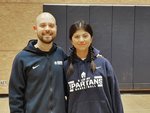



Not all champions hoist trophies.
Fatima Daryabi’s statistics don’t pop. The Solebury School senior scored three goals for the girls soccer team this fall and made five appearances as an enthusiastic reserve for the girls basketball team this winter.
“When she is on the bench, she is everyone’s biggest cheerleader,” noted Solebury girls soccer coach Tommy Harkanson. “They all look to her for the first high five.”
Yet if Lionel Messi or LeBron James ever found themselves on Solebury’s campus, Fatima Daryabi could teach both some lessons on winning in life.
When Harkanson sent Daryabi in for a penalty kick this year, she wasn’t attempting a 12-yarder. It was more like an 11,300-miler. That’s roughly the distance from Kabul to Abu Dhabi to Fort Bliss, Texas, to Solebury ... the journey that Daryabi made solo as a high school junior when she fled her native Afghanistan.
On Aug. 15, 2021, American high school students were soaking in the last lazy days of summer break.
On Aug. 15, 2021, Fatima Daryabi boarded a U.S. military plane ... by herself ... bound for who knows where but knowing that wherever that plane landed was almost certainly better than the home she was leaving.
“I left when the Taliban took over Afghanistan,” Daryabi said. “I left alone. I got on a military plane and didn’t know where I was going to land. I spent 15 days in Abu Dhabi in a resettlement camp. After that, they moved me to Texas and I was in a military camp for 42 days getting processed, working out my work authorization cards and things like that.”
In Afghanistan, Daryabi participated in an online book club led by American women. One of them, Mercer County’s Susan Weintraub, reached out to Daryabi and was thrilled to discover her student landed in the U.S. Weintraub contacted several area schools to try and place Daryabi. After an initial interview, Solebury School offered Daryabi a full scholarship. She arrived on campus last October.
Just days after Fatima left Kabul her brother Taqi, a journalist with an investigative newspaper, and his photographer were beaten by the Taliban for hours with “with batons, electrical cables and whips,” reported the BBC. Police were infuriated that Taqi covered a women’s protest in Kabul. When Taqi lost consciousness, the beatings finally stopped.
Taqi became an international cause celebre, with pictures of his gruesome welts and bruises showing up on both the BBC and Al-Jazeera. Even more ominous than the violation of Taqi’s human rights were what his arrest signaled: it was one of the earliest broadcasts to the world that despite cheap talk, the “new” Taliban was just as vicious as the old Taliban.
“I have brothers living in the States,” Fatima shared. “My parents recently immigrated to another country. It is hard to live in Afghanistan because of my brother who is famous. The Taliban is looking for him. They went to his office looking for him and they have searched buildings.
“It was very hard to connect with my family for a while. I get to talk to them, but there is a very big time difference and sometimes I have to stay up very late to talk them,” she continued. “And sometimes, I refuse to talk to them. It’s not because I don’t love them. It’s because I don’t know what to talk about with them.”
Here is the “sweet” part of Daryabi’s bittersweet saga. In many ways, she is a normal, happy, healthy teenager. She plays sports. She has friends and fun. She loves her school. “I have all of these amazing things happening to me in my life,” Daryabi explained. “I do so many things in and outside of school that are fun for me. I don’t feel like I want to share something like that with my parents or siblings back home, because they don’t have that, even though they are all happy for me.
“My sister talked to me about how the Taliban stopped her,” Daryabi continued, “and said the next time, if she is not fully scarved down, they will shoot her. I cannot just say ‘Yes, we had a basketball game and we won.’ Or ‘I hung out with friends and had pizza.’”
“I think everybody looks at her problems, and they are a little bigger than their own, and Fatima never looks at it as a problem. Ever,” Harkanson observed. “The girls pick up on that and want to work harder with her on the team.”
Daryabi’s life experiences forged her with iron fists in velvet gloves. On the one hand, her charisma and positivity got her elected as Solebury’s class president. Even though she was in Fort Bliss for just six weeks, Daryabi launched a book club – translating from Persian – that doubled as an English class for refugees who didn’t speak the language.
Back home, she knitted scarves and gloves so street children would have something to wear in winter. “Everyone loves Fatima” is heard repeatedly on Solebury’s campus.
At first Solebury “was kind of hard. It was very different, coming from Afghanistan and going through all of the trauma, all of the anxiety and depression from being lonely and away from home,” Daryabi admitted. “But coming to Solebury, you join a community where everyone is so nice and so welcoming in making you feel like you count. That you matter.
“I didn’t know anything about the States,” Daryabi continued. "I just saw it in the news and read books about it. Once I got here, it was the same life just in a different place.”
Part of her life that carried over was soccer. One of eight children, Daryabi loves “the beautiful game” and watched as much as she could with her brothers. “I had a favorite team,” she smiled. “For a while it was Barcelona, but then Messi got out and Neymar got out. Now, it’s Manchester United.”
“Her touch ability was really good after a few practices,” Harkanson noted. “I saw her as an attacker, just instinctually with her size, and she is pretty fast.
“I picked her for a PK one time because I knew she wouldn’t get nervous,” continued Harkanson with obvious understatement. “She is an outstanding student as well, always working hard. I taught her in two classes – health and microbiology. She got an A+ in both. She ate up the material.”
Daryabi developed a close mentorship with Harkanson. “I joined soccer because (Tommy) was inspiring me and there were so many other friends on the soccer team. It was about the teamwork and connecting with more people,” Daryabi shared. “You can come in at any level, and you are improving to get to the same level where everyone else is. The coaches are trying so hard for that (to happen).”
“And it was my way of blocking any other problem in my life,” she noted. “I was able to forget about everything and just shoot the ball. Soccer season was the best part of my life in the U.S.”
The iron fist? Daryabi couldn’t play sports back home. “We have a phrase back in Afghanistan: ‘Freedom for the neighbor’s daughter,’” Daryabi grinned sarcastically. Everyone is for equality ... but don’t let my daughter be the one who breaks the mold.
“It was a privilege,” she emphasized the word, “to get to where you can play sports. Education is not a right. It’s a privilege. You have to fight for it.”
Fight she did, getting up at 5 a.m. and biking the 40 minutes to school – against her parents’ wishes – so she could join that book club.
She still fights. In some sense, Daryabi’s life could be seen as a winning Powerball ticket. Daryabi doesn’t look at it that way.
“There are millions and millions of girls back home who cannot go to school and cannot get out,” Daryabi pointed out. “I had survivor’s guilt for a while and I still feel it, but I don’t let it get in the way of fighting for what is right. Fighting for what I know can make a change.
“I don’t know what I am going to study for but I know which direction I am going,” she continued. “Maybe journalism or medical because those services are what we need in Afghanistan. I lost my best friend three years ago, after a bomb explosion because the hospital refused to do services because she couldn’t afford it. That is heartbreaking.”
“She’s tough to talk about honestly,” Harkanson admitted. “She’s so impressive that I struggle to find words sometimes. It’s crazy to think that somebody living in Afghanistan just a couple of years ago is so well adjusted and is a normal American teenager now. She is a leader across the board while still learning the language – and teaching the language – to other people.
“You can say any attribute you want and it fits her,” he finished. “She is unbelievable.”
“I know what I want to do in the future: stand for who I am and stand for everyone that needs someone to take their hand. That is the biggest part of my heart leading me the way I am going,” Daryabi shared. “I feel the responsibility and I feel like I have the opportunity, so why not?”
Join our readers whose generous donations are making it possible for you to read our news coverage. Help keep local journalism alive and our community strong. Donate today.